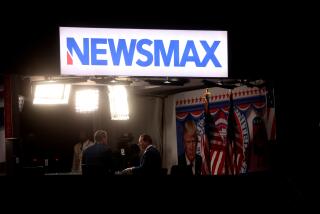Computer Bulletin Board Libel Suit Settled for $1 : First Amendment: Closely watched case of man who criticized firm’s stock does not resolve electronic free-speech issue.
- Share via
A man who criticized a company’s stock on a computer bulletin board has declared victory after settling the resulting libel suit, but First Amendment lawyers say the case falls short of expanding protection for electronic conversations.
Medphone Corp., a Paramus, N.J., medical equipment company, raised eyebrows last year after it sued Peter DeNigris of Babylon, N.Y., for posting a series of downbeat comments about the publicly traded company on “Money Talk,” a bulletin board run by the Prodigy computer service where investors can swap tips and assess stocks.
The case had drawn attention as a possible test of the limits of free speech on computer bulletin boards. Although Medphone had sued DeNigris for up to $40 million, citing in part the drop in the company’s stock, each side agreed in papers filed last month to exchange $1 and settle the dispute.
“Freedom of speech prevailed,” said DeNigris, 42-year-old administrator for the Board of Election of Suffolk County on Long Island. Medphone executives and the company’s attorney in the case did not return telephone calls Monday.
But while DeNigris says he feels emboldened by what he claims is a victory, libel lawyers say he and others who use electronic bulletin boards should not get carried away with their rights to freely express themselves. The experts say the same rules govern written speech, whether the comments are printed on paper or electronically.
Because electronic bulletin board users are likely to be alone in their home or office when they send messages, they may slip into feeling that no one is watching or listening. But they are not alone, the lawyers say, and that increases the risk that defamatory comments of any kind will lead to lawsuits.
“The electronic bulletin board is not a telephone and not like talking to someone in the privacy of your home or office,” said Floyd Abrams, a New York attorney specializing in libel law who often represents the New York Times.
The bulletin boards are services that let people send messages to each other or have conversations via their personal computers. Millions of Americans now regularly log on to these services.
“These are the kinds of conversations that used to be held over the back fence or in a bar. . . . This takes it all and puts it in writing,” said Robert Sack, a libel attorney at the law firm Gibson Dunn & Crutcher, which represents Newsday and the Wall Street Journal.
Sack said libel would have been hard to prove because Medphone would have to show, among other things, that the statements at issue were false. Since DeNigris was merely expressing his opinions, he was probably safe. Medphone stock now trades at a fraction of where it stood when DeNigris started posting his comments.






